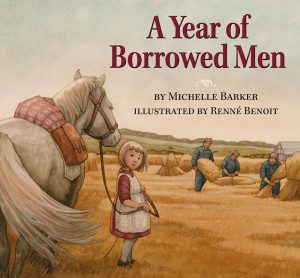 “A Year of Borrowed Men tells a story from World War II that will be unfamiliar to many readers, but is nonetheless a moving part of the history of the German-Canadian community. The author writes from her mother Gerda’s recollections, bringing to life the engaging voice of the younger Gerda, whose family hosted three French prisoners-of-war on their German farm in 1944.
“A Year of Borrowed Men tells a story from World War II that will be unfamiliar to many readers, but is nonetheless a moving part of the history of the German-Canadian community. The author writes from her mother Gerda’s recollections, bringing to life the engaging voice of the younger Gerda, whose family hosted three French prisoners-of-war on their German farm in 1944.
World War II from the German perspective remains some what problematic: how do we reconcile decades of erroneous equation of “German” with evil, with the real experiences of many Germans during the war? While the topic is dealt with effectively in some texts—Roberto Innocenti’s Rose Blanche (1985), Marcus Zusak’s The Book Thief (2005), John Boyne’s The Boy in the Striped Pajamas(2006), among others—it will take so many more stories for truth to overcome the stereotypes. A Year of Borrowed Men contributes positively and significantly to our understanding of the compassion of some of the German populace who placed themselves in an almost untenable psychological and ideological situation.
Gerda’s father was “borrowed” by the German army, and in his place the government sent three French prisoners—Gabriel, Fermaine, and Albert—to work the land. Gerda’s innocent narrative perspective ensures that the dark reality of Germany’s forced labour policy is not brought out. With the egalitarianism of young children, Gerda cannot understand why the three must live with the animals, and eat in the “pig’s kitchen,” where the slops were prepared. That was the rule though: these men were prisoners and were to be treated as such. Inviting them in to dinner one night almost sent Gerda’s mother to prison herself, yet the family could not deny their fundamental humanity. Despite regulations, in the face of threats, Gerda and her mother find little ways of making the Frenchmen’s lives more tolerable: extra butter on their bread, catalogues to cut into elicit decorations at Christmas, sneaking treats for them to eat. The men reciprocated with affection for their little German freunde: “I couldn’t keep the borrowed men here,” Gerda observes at the end of the war, “but we were friends—and I could keep that forever.” The story is made more powerful by the fact that Gerda did indeed keep that friendship alive: enough that her daughter has retold their story for her grandchildren’s generation to learn.”—Resource Links

